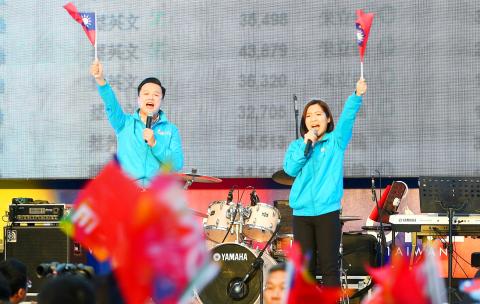A group of young Chinese Nationalist Party (KMT) members yesterday announced the formation of the “Grassroots Alliance” (草協聯盟), which aims to transform the party via a “guerrilla reformative project” that aims to address issues such as intra-party democracy.
The group includes KMT Youth League Secretary-General Lee Zheng-hao (李正皓), KMT International Information and Events Center director Hsu Chiao-hsin (徐巧芯), KMT Youth League chief Hsiao Ching-yan (蕭敬嚴) and former league chief Lin Chia-hsing (林家興).
The group called on the party and its members to support the project, which has six aims: To establish intra-party democracy, encourage young people to participate in politics, reform party affairs, solve the party’s dilemma over its assets, and stimulate debates over the party’s cross-strait policies and its identity narrative.

Photo: CNA.
Those who intend to run for the party’s chairmanship should reveal their intentions and set out concrete policies detailing in which direction they would take the party, the group said, adding that at least one policy presentation event and one debate should be held before the election.
The requirement that candidates should have served on the party’s Central Committee should be scrapped, the group said.
“Five percent of county and city councilor candidates fielded by the party should be younger people,” the alliance said. “The party should also set up a reform committee to reflect on the causes of the party’s electoral rout and committee members should not be restricted to party members.”
“The party’s assets have become the KMT’s debt,” Lee said. “The party should, while maintaining current and retired party workers’ benefits, formulate clear principles to manage its assets that meet the public’s expectations.”
“Only when the party’s dilemma over its assets is dealt with definitively will the KMT behave like a normal party — counting every cent it spends,” Lee said.
With regard to the party’s identity, Hsiao said that as Taiwanese adhere to different ideologies and national identities, the party should hold a debate on the direction of its cross-strait policies and formulate a position that is suitable for Taiwanese as a whole.
“The party’s stance that the Republic of China is the nation’s core value and Taiwan its identity should be rethought,” he added.
Hsu called on young people who support the KMT to become members and exercise their rights to join party representative elections and reform the party.
“We are going to promote our reform ideas by making public speeches in the six special municipalities starting from next week, and we also plan to launch a signature drive to solicit more support,” Hsu said.

Conflict with Taiwan could leave China with “massive economic disruption, catastrophic military losses, significant social unrest, and devastating sanctions,” a US think tank said in a report released on Monday. The German Marshall Fund released a report titled If China Attacks Taiwan: The Consequences for China of “Minor Conflict” and “Major War” Scenarios. The report details the “massive” economic, military, social and international costs to China in the event of a minor conflict or major war with Taiwan, estimating that the Chinese People’s Liberation Army (PLA) could sustain losses of more than half of its active-duty ground forces, including 100,000 troops. Understanding Chinese

The Ministry of Foreign Affairs (MOFA) yesterday said it is closely monitoring developments in Venezuela, and would continue to cooperate with democratic allies and work together for regional and global security, stability, and prosperity. The remarks came after the US on Saturday launched a series of airstrikes in Venezuela and kidnapped Venezuelan President Nicolas Maduro, who was later flown to New York along with his wife. The pair face US charges related to drug trafficking and alleged cooperation with gangs designated as terrorist organizations. Maduro has denied the allegations. The ministry said that it is closely monitoring the political and economic situation

UNRELENTING: China attempted cyberattacks on Taiwan’s critical infrastructure 2.63 million times per day last year, up from 1.23 million in 2023, the NSB said China’s cyberarmy has long engaged in cyberattacks against Taiwan’s critical infrastructure, employing diverse and evolving tactics, the National Security Bureau (NSB) said yesterday, adding that cyberattacks on critical energy infrastructure last year increased 10-fold compared with the previous year. The NSB yesterday released a report titled Analysis on China’s Cyber Threats to Taiwan’s Critical Infrastructure in 2025, outlining the number of cyberattacks, major tactics and hacker groups. Taiwan’s national intelligence community identified a large number of cybersecurity incidents last year, the bureau said in a statement. China’s cyberarmy last year launched an average of 2.63 million intrusion attempts per day targeting Taiwan’s critical

AGING: As of last month, people aged 65 or older accounted for 20.06 percent of the total population and the number of couples who got married fell by 18,685 from 2024 Taiwan has surpassed South Korea as the country least willing to have children, with an annual crude birthrate of 4.62 per 1,000 people, Ministry of the Interior data showed yesterday. The nation was previously ranked the second-lowest country in terms of total fertility rate, or the average number of children a woman has in her lifetime. However, South Korea’s fertility rate began to recover from 2023, with total fertility rate rising from 0.72 and estimated to reach 0.82 to 0.85 by last year, and the crude birthrate projected at 6.7 per 1,000 people. Japan’s crude birthrate was projected to fall below six,